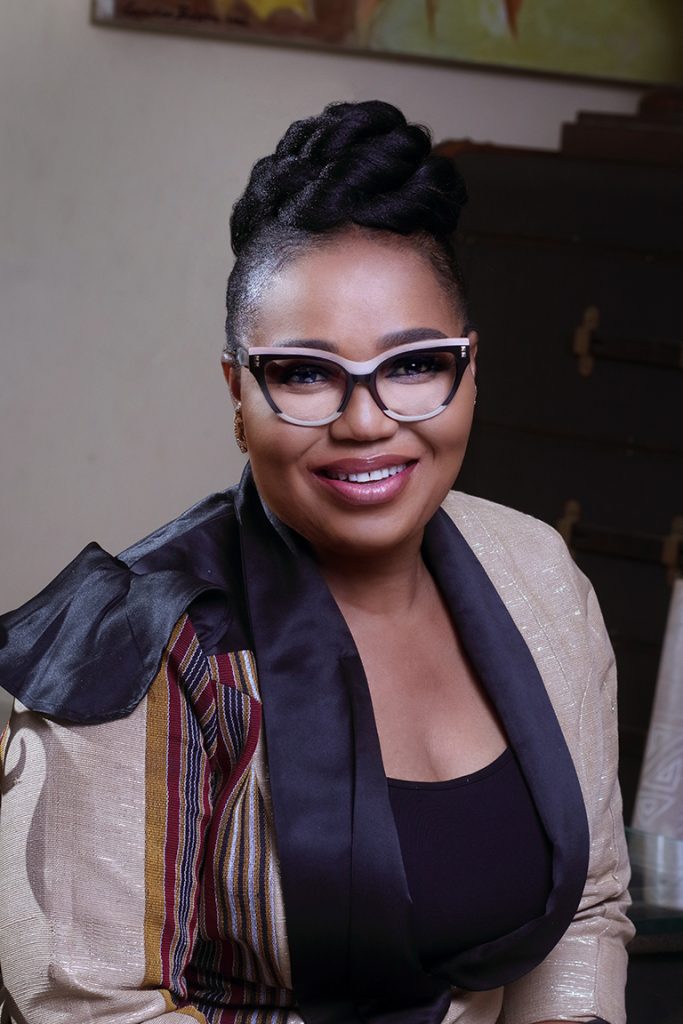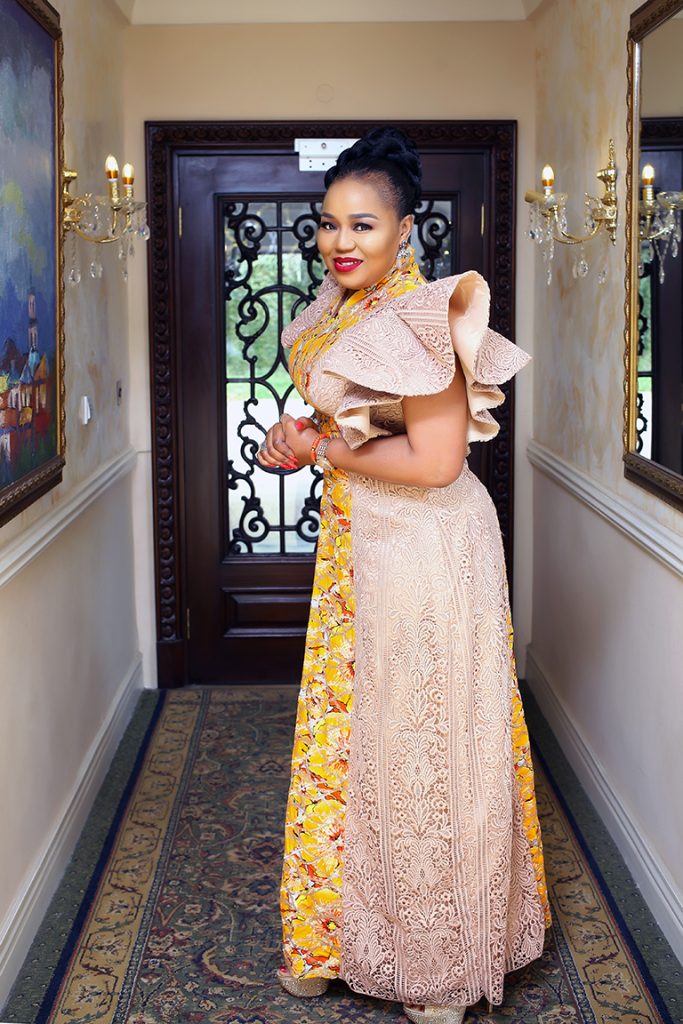Promoting African Fashion Globally – Folashade Balogun

Folashade Balogun
The launch of her fashion brand House of SOTA, about six years ago, saw Folashade Balogun boldly stamp her arrival on the Nigerian and international fashion scene.
Discovering her creative flair earlier in life, Shade as she’s simply called did not follow her gift, until, after a stint in the oil and gas sector. Launched with the aim to promote African clothing globally, House of SOTA designs depicts a rich African cultural heritage, influenced by African and western fashion. With stores in the US and different cities across Nigeria, she services a diverse range of clients addressing their needs both domestically and internationally, while feeding the diaspora market with the much sought-after African wears.
She shares with Allure her passion and love for the African brand, her very humble background, and breaking new grounds.

You recently celebrated; Black History Month with the launch of your spring collection. Does it have any correlation with Black History Month in the US and the UK? What does it mean to you?
Yes, it does. Actually, Black History Month is celebrated in America, Canada, and the UK in October. It is all about celebrating us, our historical background, and a more formal time, to remember and honour those who came before us. It is a very significant event for me because; I believe we should celebrate ourselves as Africans. If we don’t celebrate ourselves nobody will.
I have been in this business for the past six years. We have a store in America, and over the years, I found out that white Americans love our brands, what we do, and what we wear. As a matter of fact, the Kaftans that our men wear here are called African suits, and I have white clients who come to my shop to buy them.
As blacks, we do not appreciate what we have. I took it upon myself to always rock African attire whenever I am travelling, and whenever these people see me in my Ankara, they are like, “oh wow, this is so beautiful”. Two years ago, I was wearing one of my designs made with adire and aso oke, I was on a flight from Orlando to Las Vegas when I stood up to use the toilet, the air hostess followed me to the toilet, just to appreciate what I was wearing. She asked where I got it from, I told her it was from me, she went on-site and bought it. If these people want to be us, and we are trying to be like them, then I think something is wrong somewhere. So Black History month for me is so significant. I love what we have and I have to celebrate Africa proudly. I do not believe that any other foreign brand is better.
So what is it like running a business in Nigeria and the US, how would you compare both, market-wise?
Lots of bills, believe me, we are really enjoying in Nigeria. In America, you have to pay your tax, you have to pay your rent, you have to pay lots of bills but, guess what; the market is there. That is what has kept us going. People love what they see, they love what we are selling. However, it has not been easy, especially with the exchange rate.
So how do you deal with the exchange rate issue?
As I said, it is not easy but we try to strike a balance.
Where do you get inspiration for your designs?
Sometimes, it could be around me, when I see someone, for instance, what you are wearing is a beautiful style, and it could be nice in Ankara or Aso-Ebi, then I could twist it a bit. Sometimes I could be watching a movie and I get an idea. My inspiration comes from anywhere and everywhere. So it is just a gift from God.
What do you love about being a designer?
I love the fact that I make people happy, and comfortable with what they wear. Most of our designs are casuals, but even in our casuals, you look chic and trendy. Anywhere I walk into, even if it is a birthday, or a wedding, party there is always a wow factor. Again when people say they love what I am are wearing, that makes me happy. I love putting smiles on people’s faces.
What could be the most uncomfortable about the job?
I don’t like it when I am trying to make a client happy and the client would not have it or just refuses to be happy. You know that there are some clients that are like that. They complain about everything. That is why most of the time, we don’t do bespoke. I only make bespoke for people very close to me, people who understand what we do. I prefer you to go to our store to pick what you want, with that; we don’t get to have problems.
Before fashion you were into oil and gas, why did you leave oil and gas for fashion?
I am still into oil and gas. I have a filling station. The oil and gas industry is not really as lucrative as when I started. When I started oil and gas, it was very profitable. But right now, a lot has changed. Again, it is about following my passion. I have a strong passion for fashion and decided to fulfill my dream.
What was growing up like for you, especially coming from two different ethnic groups?
I speak Yoruba and Igbo very well. My mother is from Ondo State, while my father was from Imo state. He died during the war. He was a naval officer. My mother single-handedly trained all of us.
And what in your upbringing informed the woman you are today?
Growing up was very tough, it wasn’t easy because I lost my father early. And in those days, the Igbos were very strict with their widows. When a husband dies, they strip the woman naked, they take everything away from her and she is left alone. That was the same thing that happened to my mother. So my childhood wasn’t really interesting, we were all living in a one-room apartment and she had to do so many things, just so she could take care of us. She used to sew. She has a chemist, she is still alive. My mom is very creative too, and she loves fashion too. I can say I got that from her, looking at her then as a teenager, inspired me a lot. I grew up in Mushin, and I must say that the Mushin in me is really helping me. It is good to be street-wise. When you are streetwise even when you are facing any challenge you look at it as one of those things. My upbringing has really impacted my life greatly.
What is the most memorable thing that comes to mind anytime you remember growing up in Mushin?
Hmm… we lived in a one-room apartment where we didn’t have access to a proper toilet, and those were very interesting times. I tell my children that when we send them abroad to school, it’s a privilege, it’s not as if they are entitled to it. So, I let my children know all these. I tell them, to go out there and work hard like their lives depend on it. And that has really paid off, because all my children made first class, and are doing well today, thanks to God. My upbringing really gave me a different view of life.

How do you cope with work and family?
When I first started my business, it was a bit challenging because I had to do school runs, go to the depot, then; my filling station was in Seme, before I had one in GRA. Now my kids are all grown up. I am a grandmother of two. All my kids are graduates, my first son is happily married with two daughters, my second son is here with me, my third son is a pilot in the US, and he is flying already. My only daughter graduated in 2020, she is a psychologist working in the US. I have four children, three males, and a female.
What is your perception of the fashion industry in Nigeria today?
I must say we are doing very well.
What, in your opinion, are some of the ways African fashion designers can be supported so that they can become global businesses?
The government needs to support us financially. African fashion is really out there, and globally people love what we are doing. We are very creative in Nigeria, but we need the government’s support in every way. Apart from finance, they should put the right structures in place, so we can have ease of doing business like our counterparts in other countries, and be able to mass-produce. When this is done, a time will come when you can walk into a shop and buy a Nigerian-made dress off the rack like in western countries. It is achievable.
What is your eventual dream for House of Sota?
My dream for House of Sota is for the brand to become like Zara. That is why we are opening outlets in different parts of the continent.
I want the House of Sota to live after me. When I am gone, there will still be House of Sota, just like some of the popular international brands that we don’t know who owns them.
When you are not working, how do you relax?
When I am flying, I relax on the flight, I love travelling a lot. If I am not in Lagos, I am in Abuja, if I am not in Abuja, I am in Owerri, or in the US. I love travelling a lot.
Where in the world is your favourite holiday destination?
I do not really go on holiday. I can’t remember the last time I went on vacation, maybe on a business trip because even when I am in the US, it is not a vacation. Throughout the Christmas and New Year holidays, I was working, setting up the second store. On Christmas day, in the US, we went to the motherless babies’ home and gave out blankets and food. In Lagos, we normally do orphanages. So I can’t remember the last time I went on vacation.
So what lessons have you learned about life?
A lot; don’t look down on people, be friendly, be nice. When my children were young, I trained them not to look down on people, but to be nice. Even if that person is a beggar, be nice, because that beggar might be a billionaire tomorrow. You never can tell.
CREDIT









